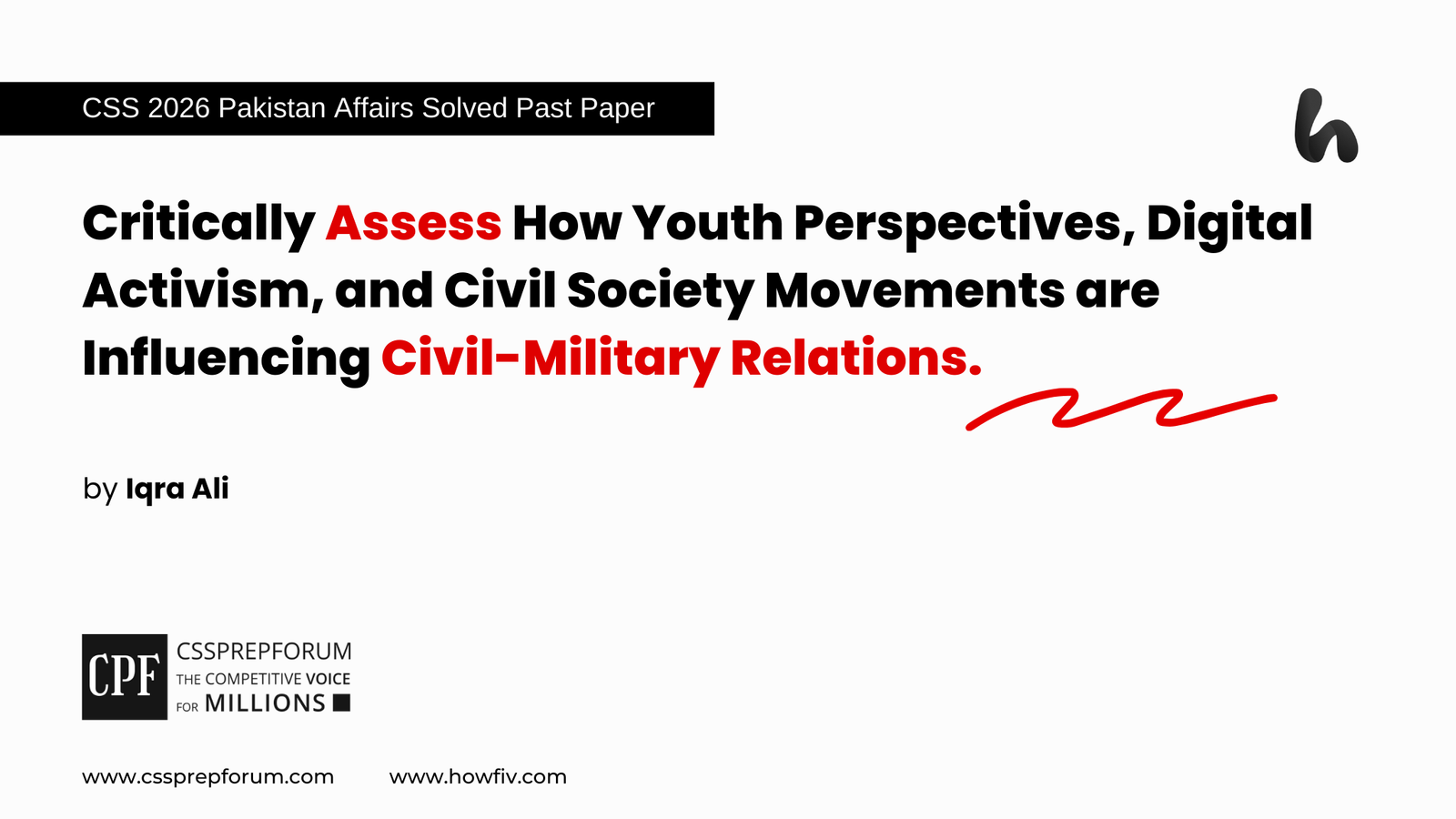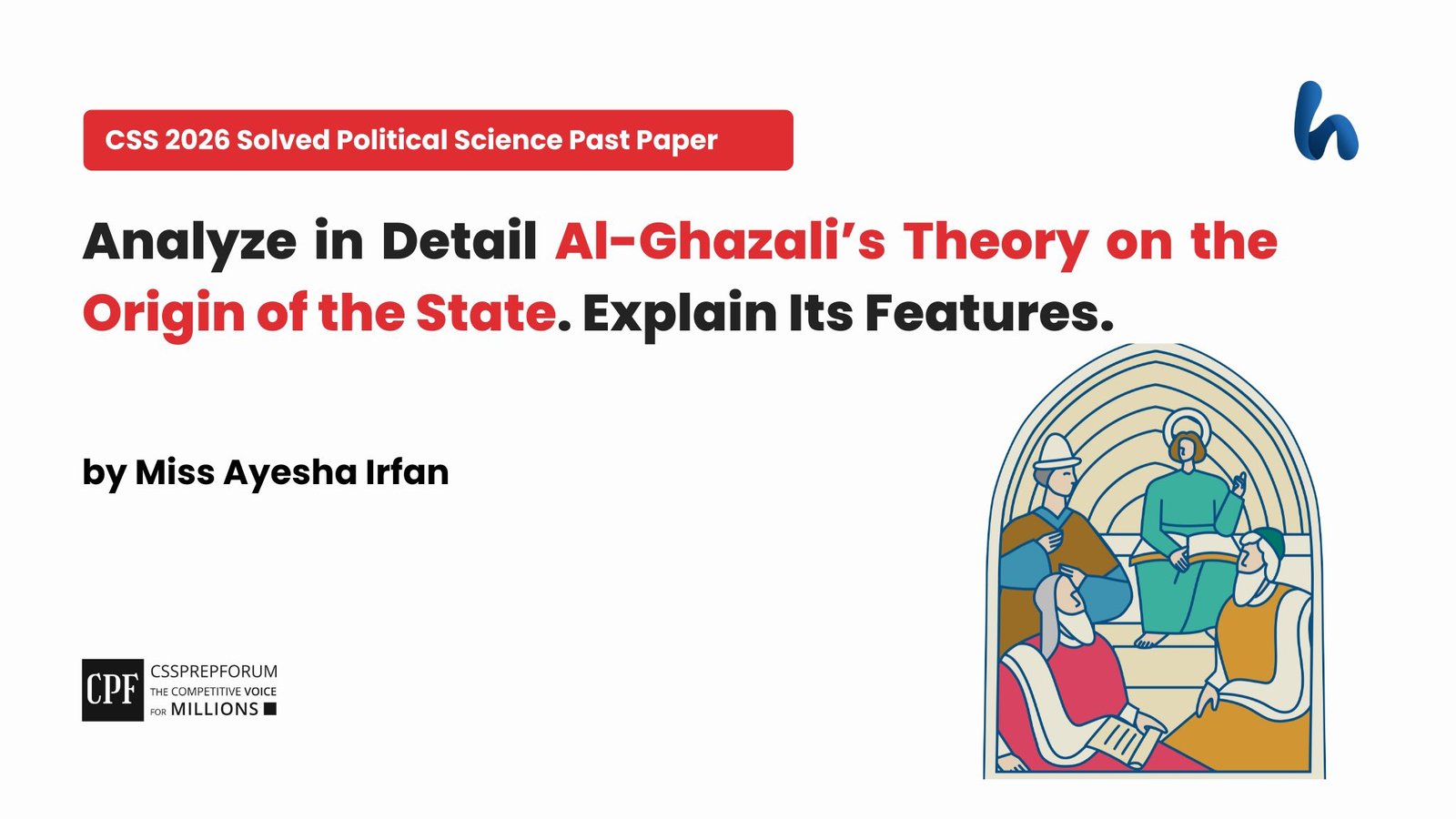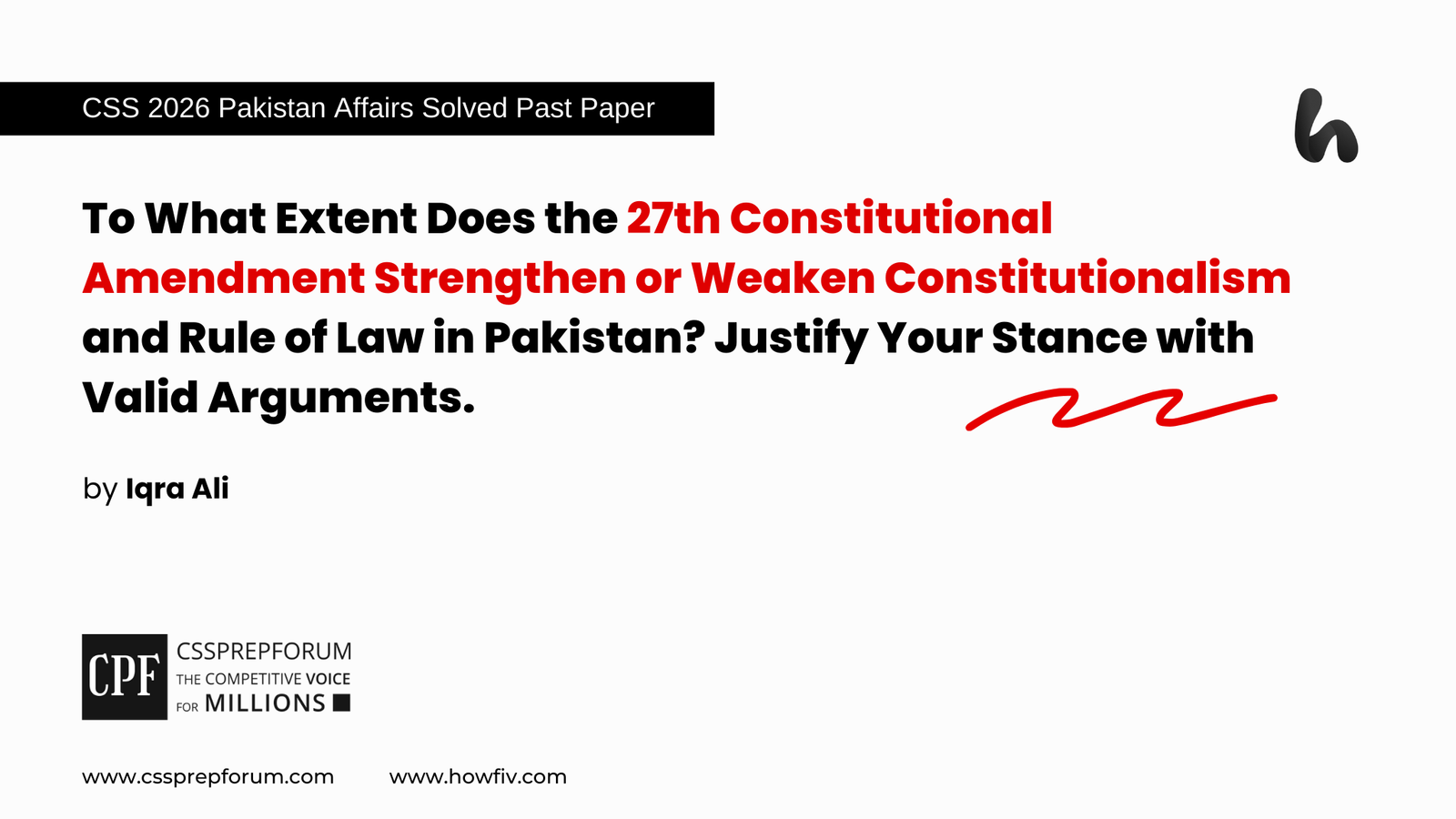CSS 2017 Solved Pakistan Affairs Past Papers | General Elections and Democracy in Pakistan
The following question of CSS Pakistan Affairs 2017 is solved by Miss Iqra Ali, the best Pakistan Affairs Coach, on the guided pattern of Sir Syed Kazim Ali, which he taught to his students, scoring the highest marks in compulsory subjects for years. This solved past paper question is uploaded to help aspirants understand how to crack a topic or question, how to write relevantly, what coherence is, and how to include and connect ideas, opinions, and suggestions to score the maximum.

Question Breakdown
In this question, there is need to shed light on the 2002, 2008, and 2013 election’s effect on democracy in Pakistan.
Outline
1-Introduction
2-Saga of Elections and its Impacts on Democracy in Pakistan
3-General Elections and its role in strengthening Democracy in Pakistan
3.1- General Elections of 2002 and its role in strengthening Democracy
- ✓Greater Political Representation
- ✓Women Representation
- ✓Base for Future Democratic Setups
- ✓Empowerment of Provincial Governments
3.2- General Elections of 2008 and its role in strengthening Democracy
- ✓End of Military Rule
- ✓Relatively Free and Fair Elections
- ✓Parliament Supremacy and Empowerment of Provinces
- ✓Political Stability
- ✓Women Empowerment
- ✓Electoral System Improvement and introduction of neutral oversight
3.3- General Elections of 2013 and its role in strengthening Democracy
- ✓A Successful Democratic Transition
- ✓Impartial and Transparent Elections
- ✓Public Engagement and Participation in the Democratic Process
- ✓Inclusive Political Landscape
- ✓Judicial Oversight in Electoral Process
4-Conclusion

Answer to the Question
Introduction
Elections in a democratic country are a way to elect a leader to run the country and give him ultimate authority to make decisions, both at the national and international levels, in favour of the general public. It is a foundation stone on which a democracy stands erect. Pakistan, being a democratic country, have also gone into elections many times to choose a leader through people’s mandate. Despite several shortcomings, elections have contributed to strengthening democracy in the country, may it be 2002 and 2008, which were held under military rule or the 2013 general elections, which were held under civil rule. All these elections provided a conducive environment for democracy to flourish through fairness in the electoral process, greater participation of women in elections, and empowerment of provincial governments. These elections have added political stability and the elected governments brought back parliament supremacy. In short, elections in Pakistan, despite some deficiencies, have been a beacon of hope for democracy to prosper in the country.
Saga of Elections and its Impact on Democracy in Pakistan
Pakistan has been a claimed democratic state since its independence on August 14, 1947. However, the country has struggled to become a truly democratic state as the country has, in the past, seen three different constitutions, three prolonged military coups, and interestingly, no PM in Pakistan has been able to complete its five-year period so far. Despite being a democratic state in theory, the country witnessed its first-ever general elections in 1970, but sadly, its fairness led to the separation of the country’s eastern wing, now Bangladesh. The military has played an important role in thwarting democracy in the country, either through driving the country directly or by calling the shots behind the scenes; as a result, despite the country being 77 years old, the country still struggles to become democratic in essence. Though the 2002 and 2008 elections were contested under military rule, it led to a government that has so far put the country on track towards democracy. The elections of 2013 further enhanced the country’s democratic characteristics.
How the 2002, 2008, and 2013 General Elections Strengthened Democracy in Pakistan
A- How the 2002 elections strengthened democracy in Pakistan
- Greater Political Participation
The elections enabled greater participation of the public in the political process as the voter’s age was reduced from 21 to 18 years, which added 5 million to the electorate; the number of National Assembly seats was increased to 342 to allow greater political representation; provincial assembly seats were increased to 728 for increasing say of different regions of the provinces in their provincial matters; and minorities were also given the right to vote for general seats- a major step taken since 1977. Overall, seventy-seven political parties participated, which reflects greater political pluralism under the military setup.
- Women Representation
The electoral reforms gave 60 reserved seats in the National Assembly to women, which were previously limited to 20 seats only. All this suggests a shift towards democracy in governance structure by including all segments of the population in national decision-making.
- Base for Future Democratic Setups
The 2002 elections set up the stage for strengthening civilian rule in the country, albeit under military oversight. This step towards elections set the groundwork for 2008 elections and return of democratic government as the 2002 elections initiated a political struggle under semi-authoritarian regime, which eventually ended in Musharraf’s resignation and led to a democratically elected government after 9 years of military’s rule.
- Empowerment of Provincial Governments
The 2002 general elections also involved provincial elections, which was a move to decentralize governance and empower provinces. The provincial seats were increased to 728 to increase the representation of provinces in the parliament. All this was meant to represent all regions of provinces in decision making concerning their provinces, in general, and their areas, in particular.
B- How the 2008 elections strengthened democracy in Pakistan
- End of military rule
The 2008 elections successfully concluded the near decade military rule, restoring civilian governance. reinstated confidence of general public on democratically elected leadership.
- Relatively Free and Fair elections
A transparent and democratic voting process is indeed a fundamental component that contributes to strengthening democracy in the country. February 2008 elections were relatively free and fair in 61 years of the country’s history, but this fairness cost the military’s favoured political party, the PML-Q, which, earlier in 2002, won many seats. PPP won in Sindh while PML-N secured a majority in Punjab; however, a PPP-led coalition government was formed at the Centre. All this projected a declining role of the military in the civil affairs of the state, which helped democracy to mature.
- Parliament Supremacy and Empowerment of Provinces
Parliament was made powerful by repealing Article 58(2b), transferring many presidential powers to the prime minister, including the president’s power to dissolve the assembly. This increased political confidence in the Parliament. The 7th NFC Award allocated a substantial share to provinces in the national tax pool. Additionally, the 18th Amendment brought provincial autonomy, fostering trust between the provinces and the central government. Provinces were given autonomy in their financial, legislative, and governance matters, which gave provincial governments a greater degree of independence from the Centre, which actually portrays democratic norms taking firm roots in the country’s political theatre.
- Political Stability
The 2008 elections led to a stable coalition-government that successfully completed its full five-year term. For the first time, an opposition leader was appointed as the chairman of Public Accounts Committee. All this added to political stability and maturity in the country.
- Women Empowerment
The 2008 elections saw added 216 women in national and provincial legislators, making substantial presence of women in state’s political landscape, and for the first time, a PPP’s female candidate, Dr. Fahmeeda Mirza, was appointed the speaker of National Assembly. At the same time, Dr. Shahla Raza was appointed Deputy Speaker in Sindh’s provincial assembly, marking a significant milestone in state’s political leadership. This inclusive participation in the country’s political process strengthened democratic values and political participation.
- Electoral System Improvement and introduction of neutral oversight
The government elected as a result of the 2008 elections passed the 20th Amendment that aimed to make the Election Commission of Pakistan an independent institution and install a neutral caretaker government to oversee the elections once the sitting government completes its age. The purpose was to hold free and fair elections in the country so that the mandate of the public is duly represented and democracy gets a conducive environment to strengthen in the country.
How the 2013 elections strengthened democracy in Pakistan
- A Successful Democratic Transition
The 2013 elections came directly after a democratically elected government completed its five-year tenure, and a peaceful transition was followed through these elections that marked an important milestone in the political history of Pakistan as previously, the military had interfered in politics directly, disrupting the continuation of elected governments. So, this peaceful transfer of leadership in the country signalled a maturing democratic environment in the country.
- Impartial and Transparent Elections
The 2013 elections were also held free and fair despite allegations by the losing parties. The judicial commission headed by the Chief Justice of Pakistan, Nasir-ul-Mulk, formed to probe the allegations of electoral riggings by Pakistan Tehreek-e-Insaf concluded that the elections of 2013 were organized and conducted fairly and in accordance with the law. So, the elections of 2013 were successfully concluded keeping the electoral fairness and integrity, which is actually the essence of democracy.
- Public Engagement and Participation in the Democratic Process
The 2013 elections saw greater political engagement by the public. According to the Election Commission of Pakistan (ECP), more than 46 million people expressed their support for the democratic process, which constituted a voter turnout of 55%, an increase of 11% from the 2008 elections. Voters’ conviction and resolution in casting their votes despite increasing violence in the country was a victory for democracy in the country. This depicted the people’s growing trust in democratically elected governments and public institutions as agents of change instead of military rule.
- Inclusive Political Landscape
The 2013 elections saw the rise of multiple political parties, including Pakistan Tehreek-e-Insaf led by former cricketer Imran Khan, Baloch nationalist parties, along with the return of Jamiat-e-Islami (JI), injecting a sense of competition in Pakistan’s political system and challenging the traditional dominance of two mainstream political parties: Pakistan People Party and Pakistan Muslim League- Nawaz. In short, the elections were very inclusive as diverse political actors participated in it.
- Judiciary Oversight in Electoral Processes
The judiciary played a crucial role in maintaining electoral transparency and integrity. It worked to address the electoral grievances and gave numerous rulings against the candidates holding bogus degrees under articles 62 and 63 of the 1973 Constitution. This scrutinization led to the erection of ethical standards for public office and contributed to fairer electoral practices in the country, which overall strengthened democratic practices and increased public trust in democratic institutions.
Conclusion
Pakistan has seen both the government through the people’s mandate and the government through the military’s mandate, but the essence of elections in each era can never be underestimated. Despite having flaws, and deficiencies, it has sought to improve democratic culture in the country. The elections of 2002, especially, opened doors for democracy to be nurtured, and then the 2008 elections ultimately closed the doors for dictators and strengthened democratically elected leaders. These elections brought political stability, introduced inclusivity in politics by giving women their due representation and strengthened the judiciary to become robust in accountability. In a word, the elections from 2002-2013 all led to growing democracy in the country despite many hurdles and shortcomings.
CSS Solved Past Papers’ Essays
Looking for the last ten years of CSS and PMS Solved Essays and want to know how Sir Kazim’s students write and score the highest marks in the essays’ papers? Then, click on the CSS Solved Essays to start reading them.
CSS Solved Essays
CSS Solved General Science & Ability Past Papers
Want to read the last ten years’ General Science & Ability Solved Past Papers to learn how to attempt them and to score high? Let’s click on the link below to read them all freely. All past papers have been solved by Pakistan’s top CSS GSA coach having the highest score of their students.
General Science & Ability Solved Past Papers











